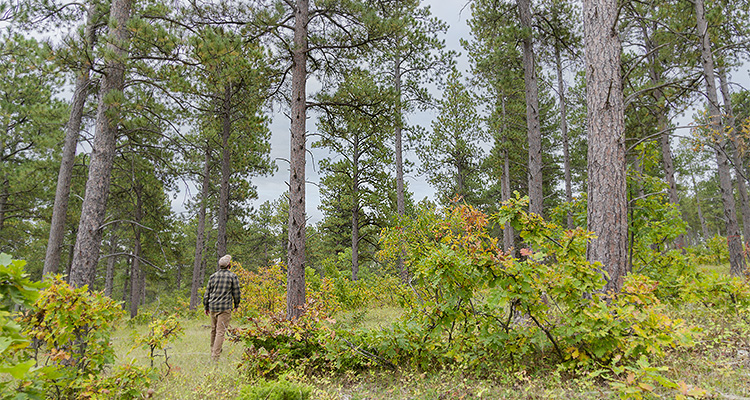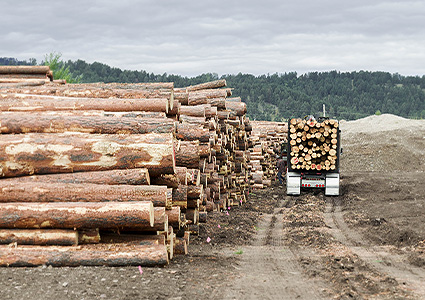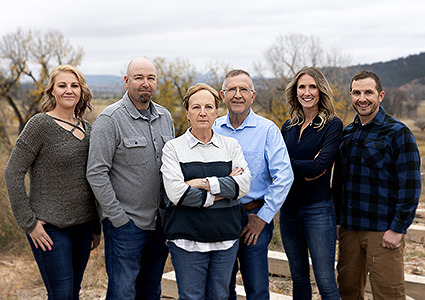
How healthy forests help ensure the longevity of Neiman Enterprises
Neiman Enterprises began nearly 90 years ago with a single sawmill. President, Jim Neiman represents the third generation of the family business, and he briefly outlines the company’s history for MT: “My grandad began this operation in the sawmill business in 1936. Fast forward to today, and with my children involved in the business, we are now in the fourth generation in sawmills, plus the family has a ranch operation that goes back a couple of generations further originating from the family’s home-steading days. So, our roots run deep.
“I have been involved in the business since I was a child but on a full-time basis since 1974 after I graduated from the University of Wyoming. Our headquarters is in Hulett, Wyoming, where we have the smallest of our four mills.” With operations stretching from Oregon to South Dakota, Neiman Enterprises produces a variety of high-quality soft wood lumber products for various industries. Jim expands: “The Hulett operation produces shop grade lumber, our primary customers being window companies including Pella Windows & Doors, Andersen Windows and Marvin Windows. In South Dakota, we produce cash and carry items including pine paneling, in Oregon, a combination of both mills. In Colorado we produce studs; 2×4 and 2×6, mainly materials for building homes. We have a greater variety of products now as most of our expansion has taken place in the last 25 years.” 
Jim goes on to expand on the quality of the products: “It’s something we take great pride in. One of the ways to compete with large corporations as a small company is to ensure you provide the best quality product alongside the best possible service. If you don’t provide those two things, then you become one of the many commodity suppliers. So, you must distinguish yourself above the rest.
“We learned a lot about how to ensure we make the highest quality products from one of our remanufacturing plants that wasn’t successful and subsequently shut down,” he adds. Jim calls this experience his five-million-dollar master’s degree. Sonja Merryman, Jim’s daughter and Head of Community Relations gives more details on how they turned this challenge into a learning experience: “Our former remanufacturing business provided valuable insights that helped us improve our sawmill operations. Seeing firsthand what a reman plant values, we made strategic changes to meet those needs and stand out in the industry. The experience emphasized the importance of education and quality, guiding improvements across our entire organization.”
Working in the timber industry, forest health is of great importance. Sonja sheds light on the company’s approach: “On our end, as a fourth-generation company, it’s all about the sustainability and the health of the forest. It’s directly linked to the health of the industry and our organization. That’s one of the biggest blessings about our family company; we know that the forest must be healthy for us to thrive and vice versa.”
 “The sustainability of our company is a top priority,” Jim emphasizes. “When I took over, I made a promise to my dad that I would carry it forward for at least two more generations – to my grandchildren. In the wood products industry, the connection to family is deeply rooted, much like in agricultural communities. When you’ve been part of a place – often a small town – since the 1930s, and generations of families depend on you, a unique community and culture naturally develop. While trees are a renewable resource, they can take a century to grow, which makes the family aspect even more vital. It allows us to be long-term stewards of the forest, ensuring its health and productivity for generations to come.”
“The sustainability of our company is a top priority,” Jim emphasizes. “When I took over, I made a promise to my dad that I would carry it forward for at least two more generations – to my grandchildren. In the wood products industry, the connection to family is deeply rooted, much like in agricultural communities. When you’ve been part of a place – often a small town – since the 1930s, and generations of families depend on you, a unique community and culture naturally develop. While trees are a renewable resource, they can take a century to grow, which makes the family aspect even more vital. It allows us to be long-term stewards of the forest, ensuring its health and productivity for generations to come.”
Sonja agrees, adding “the longevity of our family business is critical, we don’t pursue profits at the expense of the health of the community and forest because we have such strong bonds and interdependency on the community and forests that we live and work within. In these challenging markets for example we have made decisions that have cost us money for the benefit of the health of the community and the forest in order to create longevity as an organization.”
Sonja goes on to explain how this approach ties into other sustainability practices within the company: “We’re developing operations that will enable us to make better use of our biomass resources helping to provide green energy. We have also made significant investments to work with the US Forest Service, who we partner with, to manage and harvest unhealthy, dense forests. A critical part of our company culture is to be incredible partners to the Forest Service knowing we are their most critical tool to treat the national forest.”
After successfully navigating some challenging times, Jim is optimistic about the coming year. “With the new administration coming in, looking to protect the businesses and manufacturing, I see a breath of fresh air trying to revitalize manufacturing in our country. The wood manufacturing industry will continue to be a critical piece to solving our nation’s wildfire crisis. How do we by design and by direction, manage that to the benefit of all our citizens. The good Lord put us here to manage this land, we were assigned to take care of this, and we need to do it responsibly.”